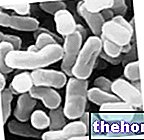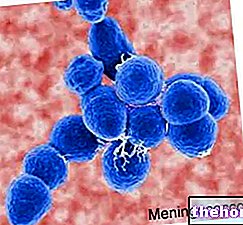Definition of endometritis
Endometritis is an infectious-inflammatory process of the endometrium, the mucous membrane that covers the inside of the uterus. When the infection also reaches the level of the myometrium, it is correctly referred to as endomyometritis.
A step back to understand ...
- The endometrium is the mucous membrane that lines the uterine cavity internally
- The perimetry is the serous tunic of the uterine cavity, a peritoneal sheet which forms the outermost part of the uterus wall
- The myometrium, on the other hand, is the muscular layer of the uterine wall, between the perimetry and the endometrium.

Endometritis is one of the most frequent causes of abnormal and unexpected uterine bleeding. Alongside these unusual uterine losses, endometritis triggers a series of symptoms, such as pain in the lower abdomen, fever and spotting.
Endometritis must be promptly treated with antibiotic therapy, specific to remove or kill the responsible pathogen.
Classification
There are two different forms of endometritis:
- Acute endometritis: predominantly affects women in the immediate post-partum period. The acute form of the disease is characterized by the presence of micro-abscesses or agglomerations of neutrophilic leukocytes in the endometrial glands. It is estimated that only 1-3% of women who have given birth to a child with natural birth, you develop an "infection of the endometrium", while women forced to a caesarean section are more at risk (the "rate of" incidence rises to 19-40%). Immediate antibiotic treatment is usually sufficient to reverse the acute infection.
- Chronic endometritis: occurs more often in women outside the gestational period. Chronic endometritis is characterized by the presence of a variable number of plasma cells in the endometrial stroma (or tunica propria). Also in this case, therapy with antibiotic drugs is optimal to remove the symptoms of endometritis.
Causes and risk factors
CAUSES
In most cases, endometritis is caused by a multiple infection; as such, the inflammation is therefore triggered by two or more pathogens.
The most involved etiological agents are bacteria of the type:
- Cocci gram +: Staphylococcus spp., Streptococcus spp. (especially group B beta hemolytic streptococcus)
- Pathogens gram -: Escherichia coli, Klebsiella spp., Proteus spp., Enterobacter spp., Gardnerella vaginalis, Neisseria spp.
- Anaerobic bacteria: Peptostreptococcus spp., Bacteroides spp.
- Others: Mycoplasma spp., Ureaplasma spp., Mycobacterium tuberculosis
RISK FACTORS
We have observed that the women most exposed to the risk of endometritis are women in childbirth. In addition to this circumstance, women are more susceptible to endometrial infections in the following cases:
- Gestational anemia
- STDs (sexually transmitted), such as chlamydia or gonorrhea
- Acute salpingitis
- Acute cervicitis
- Advanced age of the pregnant woman
- Pelvic inflammatory disease or metritis
- Neck cancer associated with infections
- Cervical stenosis (narrowing of the cervical canal)
- Investigations / surgery, such as hysteroscopy or curettage: imperfect surgery can tear the inner uterine wall, causing endometritis
- Introduction of the IUD contraceptive device. Similarly to the previous condition, endometritis, in this case, results from a lesion of the mucous membrane of the uterine lining after the imperfect introduction of the IUD device.
- Frequent unprotected sexual intercourse with individuals at risk
Symptoms
The clinical picture of endometritis is expressed in the following symptoms:
- Abnormal uterine bleeding
- General weakness
- Dyspareunia (pain during intercourse)
- High fever *
- Fever
- Severe abdominal pain
- Abdominal swelling
- Headache
- Heavy menstruation * (hypermenorrhea or menorrhagia)
- Foul-smelling and purulent uterine discharge *
- Constipation (infrequent)
- Tachycardia
Symptoms marked with (*) are characteristic - albeit not exclusive - of acute endometritis.
Normally, pain is not felt until the infection pushes beyond the endometrium, invading the myometrium as well. In such situations, the pain deriving from the inflammation of the uterus (metritis) is accentuated on palpation, during a cough or a sneeze.
An "untreated endometritis can trigger even serious complications, precipitating the clinical picture. Among the possible complications we mention: peritonitis, adnexitis, pelvic abscess and pelvic hematoma.
Diagnosis
The combination of physical examination, medical history and pelvic examination is generally sufficient to ascertain a suspicion of endometritis. In case of uncertain diagnosis, it is possible to proceed with further investigative tests. In this sense, the hypothesis can be denied or confirmed by:
- STD test (cervical cell culture for Chlamydia trachomatis, Neisseria gonorrhoeae, etc.)
- Endometrial biopsy: a tissue sample can be taken, for example, by hysteroscopy or curettage
- ESR (erythrocyte sedimentation rate in plasma)
- Laparoscopy
- CT scan (computer assisted tomography)
- Blood tests
- Examination of feces and urine
- PAP test
The differential diagnosis must be made between endometritis and all diseases that are characterized by similar symptoms, including appendicitis, pelvic inflammatory disease, pyelonephritis and urinary tract infection.
Care
Fortunately, it is quite simple and immediate to dominate and eradicate the infection in the endometrium. The treatment consists in the administration of broad spectrum antibiotics or - if the responsible pathogen is identified - a specific antibiotic.
The most used antibiotics for the treatment of endometritis are:
- Clindamycin and gentamicin, to be administered intravenously up to 24 hours after the fever subsides.
- Amoxicillin + gentamicin + metronidazole: the combination of these three drugs is used for the treatment of uncomplicated endometritis
- Doxycycline: the drug is indicated for the treatment of endometritis associated with chlamydia
In 90% of cases, antibiotic therapy against endometritis guarantees an excellent prognosis. It is observed that most women recover completely from endometritis symptoms 48-72 hours after starting treatment.
Continued: Drugs for the Treatment of "Endometritis"



























